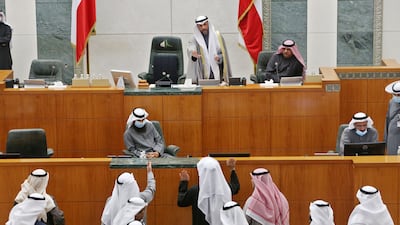Kuwait’s Constitutional Court annulling the parliament elected in 2022 and reinstituting the previous national assembly threatens to increase vote apathy, experts say.
The ruling issued on Sunday annulled the elections of last September because the constitutional court considered the decree dissolving the last parliament invalid. The assembly from 2020 was reinstated.
Specifically, the court ruled on four petitions challenging the validity of the election process filed by former MPs who failed to get re-elected last September.
The court in its final verdict said the decree that dissolved the 2020 National Assembly and a second that invited Kuwaiti voters to elect a new parliament were both “invalid” and not in line with the constitution.
The court also ordered the previous parliament be fully reinstated and regained its full constitutional powers with immediate effect.
With the return of the 2020 parliament, long-term veteran MP Marzouq Al Ghanim will also be reinstated as National Assembly Speaker.
Seen as a long-time supporter of the government, many expect Mr Ghanim to clash again with opposition MPs and prolong the feud between the government and elected parliament.
Bader Al Saif, an assistant professor of history at Kuwait University, said the move risked exacerbating voter fatigue if Kuwaitis are expected to endure more political stagnation and the prospect of heading to further elections in the near future.
“[The] Kuwaiti street [is] exhausted and in ridicule mode today. KCC looks at letter of the law while people see their reality and stuck in a perpetual impasse. Kuwait’s politics needs a reset. I’ve been calling for a national dialogue and new constitution. New thinking badly needed,” Mr Al Saif wrote on Twitter.
Professor of law and constitutional expert Dr Mohammed Al Faili said laws passed by the 2022 parliament will remain in place, despite the dissolution.
Unless the Emir or Crown Prince issue another decree dissolving parliament, the reinstituted national assembly is expected to resume its duties for the next two years with the next general election expected to take place in 2024.

“Based on the ruling, the dissolved parliament will complete its remaining period in accordance with the constitution, and the remaining period is calculated from the day the invalid dissolution decree was issued,” Kuwaiti law expert Dr Haitham Al Own told Al Qabas newspaper.
“But that does not mean neglecting the right of the Emir granted to him by the constitution to dissolve parliament yet again if the need arises,” Mr Al Own added.
The political impasse between the 2022 parliament and the government under Prime Minister Sheikh Ahmad Nawaf Al Sabah has centred in recent months on a controversial draft bill calling on the government to take over the consumer and personal loans of Kuwaiti citizens, with an estimated value of several billion Kuwaiti dinars.
The government says the move would be too expensive, costing almost $46 billion in public funds and MPs say it would cost less than $6.5 billion.
The Kuwaiti Constitutional Court’s ruling on Sunday also marked the two-week deadline for reappointed Sheikh Ahmad to form a government based on the constitution’s mandate.


